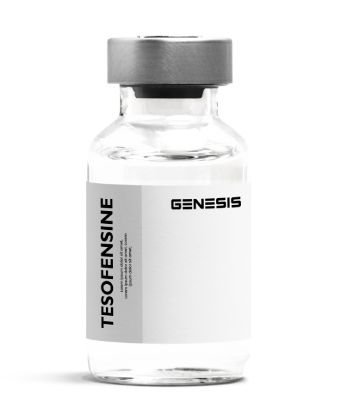Semaglutide injection is used to treat type 2 diabetes. It is used together with diet and exercise to help control your blood sugar. This medicine is also used to lower the risk of heart attack, stroke, or death in patients with type 2 diabetes and heart or blood vessel disease.
$59.50
Fights obesity [6-23]
Improves cognitive health [24-32]
Improves mood [33-35]
Improves blood sugar levels [36-38]
Increases energy levels [35, 39]
Treats sexual dysfunction [35, 40]
Treats eating disorders [8, 41-45]
Treats attention-deficit/hyperactivity disorder (ADHD) [46-49]
Improves sleep quality [50-57]
Fights alcohol addiction [58-62]
Tesofensine is a drug that was initially developed as a treatment for obesity. It belongs to the class of drugs known as appetite suppressants or slimming down medications. Tesofensine acts by inhibiting the reuptake of three neurotransmitters in the brain: norepinephrine, dopamine, and serotonin. By blocking the reuptake of these neurotransmitters, tesofensine increases their levels in the brain, leading to appetite suppression and a decrease in food intake.
Tesofensine was originally developed by a Danish pharmaceutical company called NeuroSearch A/S. It underwent clinical trials for the treatment of obesity but did not receive regulatory approval for commercial use due to concerns about its safety profile. However, the drug has gained attention for its potent effects on weight loss during clinical research.
Studies have shown that tesofensine can result in a significant increase in weight loss when compared to placebo or other weight decrease medications. It has been observed to reduce body weight, body mass index (BMI), waist circumference, and improve metabolic parameters such as blood pressure, insulin sensitivity, and lipid profiles.
Although tesofensine has shown promising results in promoting weight loss, it is important to note that the drug is not currently approved for clinical use and is not available on the market. Further research and regulatory evaluations are necessary to determine its safety and efficacy for long-term use.
It is worth mentioning that as an AI language model, my knowledge is based on the information available up until September 2021, and there may have been further developments or updates regarding tesofensine since then. Therefore, it is always advisable to consult with a healthcare professional or refer to updated scientific literature for the most accurate and current information.
Tesofensine works by targeting the central nervous system to suppress appetite and promote weight loss. It acts as a potent reuptake inhibitor of three neurotransmitters: norepinephrine, dopamine, and serotonin.
Norepinephrine is a neurotransmitter that plays a role in regulating appetite, metabolism, and energy expenditure. By inhibiting the reuptake of norepinephrine, tesofensine increases its concentration in the synaptic cleft, leading to increased activation of norepinephrine receptors. This activation can suppress appetite and increase the feeling of satiety, thereby reducing food intake and energy expenditure.
Dopamine is involved in the brain’s reward and pleasure pathways, as well as in regulating motivation and movement. Tesofensine’s inhibition of dopamine reuptake increases dopamine levels, which may contribute to its effects on reducing appetite and promoting weight loss. Dopamine’s influence on the reward system may also help reduce cravings for food.
Serotonin is a neurotransmitter associated with mood regulation, sleep, and appetite control. By inhibiting the reuptake of serotonin, tesofensine increases its availability in the brain, which may contribute to appetite suppression and the modulation of food intake.
The combined effects of increased norepinephrine, the dopamine receptors, and serotonin levels in the brain result in significant increase in appetite reduction and increased energy expenditure, ultimately leading to medical weight loss and body fat loss.
It is important to note that tesofensine is an investigational drug and has not been approved for commercial use. Further research is needed to fully understand its mechanism of action and determine its safety and efficacy for long-term use in the treatment of obesity.
IMG
IMG

Obesity is a global health concern characterized by excess body weight and adipose tissue accumulation, leading to various health complications. Addressing obesity requires effective interventions that can help individuals achieve sustainable weight loss and improve overall health. One promising candidate that has shown potential in fighting obesity is tesofensine.
Tesofensine is a novel investigational drug that has garnered attention for its ability to promote weight loss. It works by targeting the essential nervous system and modulating key neurotransmitters involved in appetite regulation and energy balance. Several studies have explored the effects of tesofensine on obesity management, shedding light on its potential as a therapeutic option.
One of the key mechanisms of action of tesofensine is its inhibition of the reuptake of norepinephrine, dopamine, and serotonin. By blocking the reuptake of these neurotransmitters, tesofensine increases their availability in the brain, leading to enhanced signaling and modulation of appetite. Increased norepinephrine levels can promote satiety and reduce food intake, while higher dopamine levels may help control cravings and regulate reward pathways associated with food consumption. Additionally, tesofensine’s impact on serotonin levels may contribute to appetite suppression and mood regulation, further supporting weight loss efforts.
Clinical trials and animal studies have demonstrated the efficacy of tesofensine in promoting weight loss. In a randomized controlled trial involving obese individuals, tesofensine treatment led to significant reductions in body weight and improved metabolic parameters compared to placebo. Additionally, tesofensine showed favorable effects on waist circumference, blood pressure, and lipid profiles, indicating its potential to as weight loss drugs address obesity-related comorbidities.
Moreover, tesofensine has been shown to have a positive impact on weight reduction and on weight loss drug maintenance. In a long-term study, individuals treated with tesofensine experienced significant increase sustained weight decrease even after the discontinuation of the weight reduction drug, suggesting its potential to produce lasting effects medical weight loss and on body weight regulation.
While tesofensine holds promise as an anti-obesity therapy, it is important to consider potential side effects and further evaluate its safety profile. Common side effects reported in clinical research include increased heart rate, dry mouth, and insomnia. Additionally, tesofensine should be used under medical supervision and in conjunction with lifestyle modifications, including dietary changes and increased physical activity, to maximize its benefits.
In conclusion, tesofensine shows potential as a valuable tool in the fight against obesity, joining the array of weight loss medications available today. Its ability to modulate neurotransmitters involved in appetite regulation and its demonstrated efficacy in promoting weight loss make it a promising candidate for future obesity management strategies and weight loss journeys. Further research and development are needed to fully understand its long-term safety and effectiveness, but nonetheless, tesofensine represents a step forward in the quest for effective treatments for obesity, offering hope for individuals seeking sustainable weight reduction and improved overall health.
 Cognitive health plays a crucial role in maintaining overall well-being and quality of life. Age-related cognitive decline and neurodegenerative disorders, such as Alzheimer’s disease, pose significant challenges to cognitive function. As researchers continue to explore potential interventions, tesofensine has emerged as a promising candidate for improving cognitive health.
Cognitive health plays a crucial role in maintaining overall well-being and quality of life. Age-related cognitive decline and neurodegenerative disorders, such as Alzheimer’s disease, pose significant challenges to cognitive function. As researchers continue to explore potential interventions, tesofensine has emerged as a promising candidate for improving cognitive health.Tesofensine, primarily known for its effects on weight loss, also exhibits neuroprotective properties and has been investigated for its potential cognitive-enhancing effects. The underlying mechanisms by which tesofensine exerts its cognitive benefits are not fully understood but may involve modulation of neurotransmitters and neurotrophic factors involved in brain function and plasticity.
One key aspect of tesofensine’s potential cognitive-enhancing effects is its ability to modulate the levels of dopamine, norepinephrine, and serotonin in the brain. These neurotransmitters play crucial roles in cognitive processes such as attention, memory, and learning. By increasing their availability and enhancing neurotransmission through dopamine receptors, tesofensine may optimize cognitive function and promote improvements in various cognitive domains.
Research studies have provided promising evidence supporting tesofensine’s cognitive benefits. In animal models, tesofensine has demonstrated neuroprotective effects and improved cognitive performance. Studies in rats have shown enhanced spatial memory and learning capabilities with tesofensine treatment, indicating its potential for reversing cognitive deficits.
Additionally, tesofensine’s impact on neurotrophic factors, such as brain-derived neurotrophic factor (BDNF), may contribute to its cognitive-enhancing properties. BDNF is involved in neuroplasticity, neuronal survival, and the formation of new neural connections. Animal studies have suggested that tesofensine can increase BDNF levels in the brain, which may facilitate synaptic plasticity and cognitive improvements.
While the potential cognitive benefits of tesofensine are promising, further research is needed to better understand its precise mechanisms of action and long-term effects on cognitive health. Clinical experiments involving human participants are necessary to validate these findings and evaluate tesofensine’s efficacy in improving cognitive function and addressing cognitive impairments.
It is essential to note that tesofensine is an investigational drug, and its use for cognitive enhancement should be approached with caution. Safety considerations, potential side effects, and appropriate dosage regimens should be thoroughly examined through rigorous clinical studies.
In conclusion, tesofensine holds promise as a novel approach to improve cognitive health. Its ability to modulate neurotransmitters, enhance neurotrophic factors, and demonstrate neuroprotective effects suggests its potential for enhancing cognitive function and addressing cognitive decline. However, further research is necessary to establish its efficacy and safety in clinical settings. Tesofensine represents a potential avenue for the development of interventions targeting cognitive health and the management of cognitive impairments.

Mood disorders, such as depression and anxiety, can have a profound impact on an individual’s well-being and overall quality of life. While traditional treatments exist, there is a constant pursuit of novel interventions that can effectively alleviate symptoms and improve mood. Tesofensine, primarily studied for its potential weight reduction and potential weight loss drug without side effects, has also shown potential in improving mood and addressing mood disorders.
Tesofensine is thought to exert its mood-enhancing effects through its actions on various neurotransmitters in the brain. It primarily works by inhibiting the reuptake of norepinephrine, dopamine, and serotonin, thereby increasing their availability and prolonging their effects. These neurotransmitters play crucial roles in regulating mood, emotions, and the overall balance of the brain’s reward system.
Research studies have provided evidence supporting the mood-enhancing effects of tesofensine. Animal studies have shown that tesofensine can reduce symptoms of depression and anxiety-like behaviors, suggesting its potential as an antidepressant and anxiolytic agent. These effects may be attributed to tesofensine’s modulation of neurotransmitter levels, leading to improved mood regulation and a sense of well-being.
Moreover, the ability of tesofensine to enhance the availability of dopamine, a neurotransmitter associated with reward and pleasure, may contribute to its mood-elevating properties. By increasing dopamine levels, tesofensine may promote a positive mood state and reduce feelings of sadness, hopelessness, and anxiety.
While the findings from animal studies are promising, it is important to note that tesofensine’s effects on mood have not been extensively studied in human subjects. Clinical research specifically targeting mood disorders are needed to evaluate tesofensine’s efficacy and safety in improving mood and alleviating symptoms of depression and anxiety.
It is crucial to approach tesofensine as an investigational drug in the context of mood enhancement. The potential benefits of tesofensine in improving mood should be weighed against possible side effects and individual considerations. Close monitoring, appropriate dosage regimens, and professional guidance are necessary to ensure the safe and responsible use of tesofensine for mood-related conditions.
In conclusion, tesofensine holds promise as a potential mood-enhancing agent due to its ability to modulate neurotransmitters and influence the brain’s reward system. Animal studies have provided encouraging results, but further research involving human subjects is required to validate these findings and determine the safety and efficacy of tesofensine in improving mood and managing mood disorders.
Maintaining optimal blood sugar levels is crucial for overall health, especially in individuals with conditions such as diabetes or impaired glucose metabolism. While several medications are available for managing blood sugar, ongoing research aims to identify novel interventions that can effectively improve glucose control. Tesofensine, primarily investigated for its weight reduce effects, has also shown potential in improving blood sugar levels.
Tesofensine is believed to influence blood sugar regulation through multiple mechanisms. It acts as a potent inhibitor of the reuptake of norepinephrine, dopamine, and serotonin in the brain, affecting the activity of various neuronal pathways involved in glucose metabolism. Additionally, tesofensine may enhance insulin sensitivity and promote glucose uptake in peripheral tissues, such as muscle and adipose tissue.
Animal studies have demonstrated the ability of tesofensine to improve blood sugar levels. Research in rodents has shown that tesofensine treatment can enhance glucose utilization, increase insulin sensitivity, and reduce insulin resistance. These effects contribute to improved glycemic control and a decrease in blood sugar levels.
Furthermore, tesofensine’s potential in improving blood sugar levels is closely tied to its ability to induce weight loss. Excess weight and obesity are known risk factors for impaired glucose metabolism and insulin resistance in fat tissue. By promoting weight loss, tesofensine may help reduce insulin resistance in fat tissue and improve glucose uptake in tissues, leading to better blood sugar control.
While the effects of tesofensine on blood sugar levels are promising in animal studies, it is important to note that human clinical trials specifically targeting blood sugar regulation are limited. Further research is needed to determine tesofensine’s efficacy, safety, and long-term effects on blood sugar control in individuals with diabetes or impaired glucose metabolism.
It is crucial to approach tesofensine as an investigational drug in the context of blood sugar improvement. The potential benefits of tesofensine in optimizing blood sugar levels should be carefully considered alongside potential side effects and individual considerations. Close monitoring, appropriate dosing regimens, and professional guidance are necessary to ensure the safe and responsible use of tesofensine for high blood pressure and sugar management.
In conclusion, tesofensine shows promise as a potential agent for improving blood sugar levels, primarily through its effects on glucose metabolism, insulin sensitivity, and weight reduce. Animal studies have provided encouraging results, but further research involving human subjects is needed to validate these findings and determine the safety and efficacy of tesofensine in optimizing blood sugar control.

Feeling low on energy can significantly impact daily activities and overall well-being. While proper sleep, nutrition, and exercise play crucial roles in maintaining energy levels for physical activity, certain medications and interventions may offer additional support. Tesofensine, primarily investigated for its effects on weight loss, has shown potential in increasing energy levels.
Tesofensine is believed to enhance energy levels through its actions on the central nervous system. It acts as a potent inhibitor of the reuptake of norepinephrine, dopamine, and serotonin, resulting in increased neurotransmitter availability in the brain. This mechanism of action may stimulate brain activity and promote wakefulness, leading to improved energy and alertness.
Animal studies have demonstrated tesofensine’s ability to increase energy levels. Research in rodents has shown that tesofensine treatment can enhance locomotor activity and reduce fatigue-like behavior. These effects suggest a potential for increased energy and motivation.
Additionally, tesofensine’s potential to increase energy levels is closely tied to its role in produce weight loss and body fat loss. Excess weight, body fat, and obesity can contribute to feelings of fatigue and low energy levels. By promoting weight and body fat loss, tesofensine may help reduce the burden on the body and improve overall energy levels.
It is important to note that while tesofensine may have potential in increasing energy levels, human clinical tests specifically targeting energy enhancement are limited. Most studies on tesofensine have focused on its effects on body and average weight reduce as compared to average body weight and average weight loss alone alone, with improvements in energy levels being secondary outcomes. Further research is needed to determine the specific impact of tesofensine on energy levels in humans.
Moreover, individual responses to tesofensine may vary, and it is essential to consider potential side effects and individual considerations. Close monitoring, appropriate dosing regimens, and professional guidance are necessary to ensure the safe and responsible use of tesofensine for energy enhancement.
In conclusion, tesofensine shows promise as a potential agent for increasing energy levels, primarily through its effects on neurotransmitter availability and potential weight loss properties. Animal studies have provided encouraging results, but further research involving human subjects is needed to validate these findings and determine the safety and efficacy of tesofensine in energy enhancement.

Sexual dysfunction is a common concern that can significantly impact the quality of life and intimate relationships. While various factors contribute to sexual dysfunction, including psychological and physiological aspects, certain medications and interventions may offer potential benefits. Tesofensine, primarily studied for its effects on weight gain and other medical weight loss used, has shown promise in addressing sexual dysfunction.
Tesofensine’s mechanism of action involves the inhibition of the reuptake of norepinephrine, dopamine, and serotonin in the brain, leading to increased neurotransmitter availability. This action on neurotransmitter systems may have potential implications for sexual function, as these neurotransmitters play important roles in regulating sexual desire, arousal, and satisfaction.
Although limited research directly explores the effects of tesofensine on sexual dysfunction, some studies provide insights into its potential benefits. Animal studies have shown that tesofensine administration can influence sexual behavior and improve sexual function in rodents. These findings suggest a possible role for tesofensine in addressing sexual dysfunction.
Furthermore, it is worth noting that tesofensine’s effects on sexual function may be secondary to its impact on weight loss. Excess weight and obesity can contribute to various factors that affect sexual health, such as hormonal imbalances and reduced blood flow. By promoting weight loss, tesofensine may indirectly improve sexual function by addressing these underlying issues.
It is essential to recognize that further research is needed to fully understand tesofensine’s effects on sexual dysfunction, especially in human subjects. Currently, most studies focus on tesofensine’s effects on body weight compared with weight gain and weight loss produced only, with sexual function being a secondary or primary outcome only. Future clinical tests specifically investigating the impact of tesofensine on sexual dysfunction are necessary to provide more definitive evidence.
Moreover, individual responses to tesofensine may vary, and it is crucial to consider potential side effects and individual considerations. Consulting with a healthcare professional is necessary to evaluate the appropriateness and safety of tesofensine for addressing sexual dysfunction, as well as to discuss potential alternative treatments and interventions.
In summary, tesofensine holds promise as a potential treatment option for sexual dysfunction, primarily through its impact on neurotransmitter systems and potential weight loss effects. While limited research is available, animal studies suggest positive effects on sexual behavior. However, further research, including well-designed clinical experiments in humans, is required to validate these findings and determine the safety and efficacy of tesofensine in treating sexual dysfunction.
Eating disorders are complex mental health conditions characterized by abnormal eating behaviors that can have severe physical and psychological consequences. While various treatment approaches exist, emerging research suggests that tesofensine may hold promise as a potential therapeutic option for eating disorders.
Tesofensine, initially developed as a weight loss medication, acts as a triple reuptake inhibitor, targeting the reuptake of norepinephrine, dopamine, and serotonin in the brain. By increasing the availability of these neurotransmitters, tesofensine may influence the brain’s reward and appetite centers, potentially modulating the disordered eating behaviors associated with eating disorders.
While clinical studies specifically investigating tesofensine’s effects on eating disorders are limited, preliminary evidence from animal and human studies provides insights into its potential benefits. Animal studies have demonstrated that tesofensine reduces food intake, body weight, and food-seeking behaviors. These findings suggest that tesofensine may help regulate appetite and reduce the compulsive nature of eating disorders.
In a clinical trial evaluating the effects of tesofensine on obesity, participants experienced significant weight loss and improvements in eating behaviors, including reduced hunger and increased satiety. Although this study focused on treating obesity only, the observed effects on eating behaviors highlight the potential for tesofensine to be beneficial in treating eating disorders.
It is worth noting that tesofensine is not yet approved for the treatment of eating disorders, and further research is needed to validate its efficacy and safety. Future studies specifically designed to investigate tesofensine’s effects on eating disorders, including anorexia nervosa, bulimia nervosa, and binge eating disorder, are crucial for a comprehensive understanding of its potential as a treatment option.
Moreover, individual responses to tesofensine may vary, and it is essential to consider potential side effects and individual considerations. Tesofensine may not be appropriate or suitable for all individuals with eating disorders, and a thorough evaluation by a healthcare professional is necessary to determine the most appropriate treatment approach.
In summary, tesofensine shows promise as a potential treatment option for eating disorders due to its ability to modulate appetite and eating behaviors. While clinical evidence specifically targeting eating disorders is limited, preliminary findings from animal and human studies support its potential benefits. Further research is required to establish the safety and efficacy of tesofensine in treating eating disorders and to determine the optimal dosing and duration of treatment.
Attention-Deficit/Hyperactivity Disorder (ADHD) is a neurodevelopmental disorder characterized by persistent patterns of inattention, hyperactivity, and impulsivity that can significantly impair daily functioning. While there are various treatment options available, emerging research suggests that tesofensine may hold promise as a potential therapeutic intervention for ADHD.
Tesofensine, initially developed as a weight loss medication, acts as a triple reuptake inhibitor, targeting the reuptake of norepinephrine, dopamine, and serotonin in the brain. By increasing the availability of these neurotransmitters, tesofensine may help regulate key brain functions implicated in ADHD, such as attention, impulse control, and motivation.
While clinical studies specifically investigating tesofensine’s effects on ADHD are limited, preliminary evidence from animal and human studies provides insights into its potential benefits. Animal studies have demonstrated that tesofensine improves attention, reduces hyperactivity, and enhances impulse control. These findings suggest that tesofensine may help normalize the neurochemical imbalances associated with ADHD.
In a clinical trial evaluating the effects of tesofensine on obesity, participants experienced improvements in cognitive functions, including attention and executive functioning. Although this study focused on weight loss, the observed cognitive effects highlight the potential for tesofensine to be beneficial in both treating obesity and ADHD-related cognitive impairments.
It is important to note that tesofensine is not yet approved for the treatment of ADHD, and further research is needed to validate its efficacy and safety in this specific population. Future studies specifically designed to investigate tesofensine’s effects on ADHD, including randomized controlled trials, are necessary for a comprehensive understanding of its potential as a treatment option.
Additionally, individual responses to tesofensine may vary, and it is crucial to consider potential side effects and individual considerations. Tesofensine may not be appropriate or suitable for all individuals with ADHD, and a thorough evaluation by a healthcare professional is necessary to determine the most appropriate treatment approach.
In summary, tesofensine shows promise as a potential treatment option for ADHD due to its ability to modulate neurotransmitter activity and improve cognitive functions. While clinical evidence specifically targeting ADHD is limited, preliminary findings from animal and human studies support its potential benefits. Further research is required to establish the safety and efficacy of tesofensine in treating ADHD and to determine the optimal dosing and duration of treatment.

Sleep plays a vital role in our overall well-being, impacting physical health, cognitive function, and emotional balance. Sleep disorders, such as insomnia or disrupted sleep patterns, can significantly affect quality of life. Emerging research suggests that tesofensine may offer potential benefits in improving sleep quality and promoting restorative rest.
Tesofensine, initially developed as a weight loss medication, exhibits a multifaceted pharmacological profile that includes the modulation of neurotransmitters involved in sleep regulation. By targeting norepinephrine, dopamine, and serotonin reuptake, tesofensine may influence sleep-wake cycles, sleep architecture, and sleep continuity.
While studies specifically investigating tesofensine’s effects on sleep quality are limited, preliminary evidence from animal and human studies provides insights into its potential benefits. Animal research has demonstrated that tesofensine increases slow-wave sleep, a deep and restorative stage of sleep important for physical and cognitive restoration. Additionally, tesofensine has been shown to reduce sleep fragmentation and improve sleep efficiency in animal models, suggesting its potential to enhance overall sleep quality.
Although clinical studies focusing exclusively on tesofensine’s effects on sleep are scarce, observations from studies assessing tesofensine’s impact on other conditions provide relevant insights. In clinical tests evaluating tesofensine for fat loss, participants reported improvements in sleep parameters, including reduced nocturnal awakenings and enhanced sleep continuity. These findings suggest a potential positive influence of tesofensine on sleep quality.
It is important to note that tesofensine is not yet approved for the treatment of sleep disorders, and further research is needed to validate its efficacy and safety in improving sleep quality. Future studies specifically designed to investigate tesofensine’s effects on sleep, including objective measures of sleep architecture and continuity, are necessary for a comprehensive understanding of its potential as a sleep-enhancing agent.
Individual responses to tesofensine may vary, and it is essential to consider potential side effects and individual considerations. Tesofensine may not be suitable for all individuals with sleep disturbances, and a comprehensive evaluation by a healthcare professional is necessary to determine the most appropriate treatment approach.
In summary, tesofensine holds promise as a potential intervention for improving sleep quality and promoting restorative rest. While direct evidence is limited, preliminary findings from animal and human studies suggest tesofensine’s potential to enhance sleep architecture and continuity. Further research is required to establish the safety and efficacy of tesofensine as a sleep-enhancing agent and to determine the optimal dosing and duration of treatment.

Alcohol addiction is a complex and challenging condition that can have detrimental effects on physical and mental health. Finding effective treatments to combat alcohol addiction is crucial in helping individuals regain control over their lives. Emerging research suggests that tesofensine may hold promise as a potential aid in fighting alcohol addiction.
Tesofensine, originally developed as a fat loss medication, exhibits a multifaceted pharmacological profile that includes the modulation of neurotransmitters involved in addiction pathways. By targeting norepinephrine, dopamine, and serotonin reuptake, tesofensine may impact the reward system and craving associated with alcohol use.
While research specifically investigating tesofensine’s effects on alcohol addiction is limited, preliminary evidence from animal studies and a small number of human trials provides valuable insights. Animal research has demonstrated that tesofensine reduces alcohol consumption and relapse behavior, suggesting its potential as an anti-addiction agent. Human trials evaluating tesofensine for weight loss have also reported a reduction in alcohol intake among participants, indicating a potential indirect effect on alcohol addiction.
In addition to its impact on alcohol consumption, tesofensine may offer benefits in addressing other aspects of alcohol addiction. Animal studies have shown that tesofensine can mitigate alcohol-induced cognitive impairments and help restore cognitive function. Furthermore, tesofensine may help alleviate alcohol withdrawal symptoms and reduce anxiety, which are often associated with the recovery process.
It is important to note that tesofensine is not yet approved for the treatment of alcohol addiction, and further research is needed to validate its efficacy and safety in this context. Future studies specifically designed to investigate tesofensine’s effects on alcohol addiction, including larger-scale clinical tests, are necessary for a comprehensive understanding of its potential as an anti-addiction medication.
Individual responses to tesofensine may vary, and it is essential to consider potential side effects and individual considerations. Tesofensine may not be suitable for all individuals with alcohol addiction, and a comprehensive evaluation by a healthcare professional is necessary to determine the most appropriate treatment approach.
In summary, tesofensine shows promise as a potential aid in fighting alcohol addiction. While direct evidence is limited, preliminary findings from animal studies and human trials suggest tesofensine’s potential to reduce alcohol consumption, address cognitive impairments, and alleviate withdrawal symptoms. Further research is required to establish the safety and efficacy of tesofensine as an anti-addiction medication and to determine the optimal dosing and duration of treatment.
Tesofensine is a promising compound known for its potential in promoting weight loss. It works by inhibiting the reuptake of certain neurotransmitters in the brain, leading to appetite suppression and increased energy expenditure. Tesofensine has shown promising results in clinical experiments as a potential treatment for obesity and overweight individuals.
The optimal timing for Tesofensine consumption may vary. Some individuals find it beneficial to take Tesofensine in the morning. It is recommended to consult with a healthcare professional or follow the manufacturer’s instructions for personalized recommendations.
The recommended Tesofensine dosage can vary depending on individual factors. It is crucial to consult with a healthcare professional to determine the appropriate dosage for your specific needs and goals.
Tesofensine is not a peptide; it is a specific compound. Peptide dosage guidelines do not apply to Tesofensine. It is essential to consult with a healthcare professional for accurate Tesofensine dosage information.
Tesofensine, like any medication, can potentially cause side effects. It is important to note that the occurrence and severity of side effects can vary from person to person. It is crucial to consult with a healthcare professional before starting tesofensine or any other medication. They can provide personalized information based on your specific health condition and medical history.
Increased heart rate: Tesofensine can cause an increase in heart rate, leading to palpitations or a rapid heartbeat. It is important to monitor heart rate regularly while taking this medication.
Elevated blood pressure: Tesofensine can raise blood pressure levels, which may be a concern for individuals with pre-existing hypertension or cardiovascular conditions. Regular blood pressure monitoring is essential during treatment.
Dry mouth: Many individuals experience dry mouth as a side effect of tesofensine. Staying hydrated and using sugar-free gum or lozenges can help alleviate this symptom.
Insomnia: Difficulty sleeping or insomnia can occur in some individuals taking tesofensine. It is generally recommended to take the medication earlier in the day to minimize sleep disturbances.
Gastrointestinal issues: Nausea, vomiting, and diarrhea have been reported as potential side effects. If these symptoms persist or worsen, it is important to seek medical advice.
Decreased appetite: Tesofensine is known to suppress appetite, which can lead to reduced food intake. While this effect can be desirable for weight loss, it may also lead to inadequate nutrient intake if not monitored carefully.
Dizziness and headache: Some individuals may experience dizziness or headaches while taking tesofensine. If these symptoms are severe or persistent, it is advisable to consult a healthcare professional.
Mood changes: Tesofensine may affect mood and lead to changes such as irritability, anxiety, or depression. It is important to discuss any significant mood changes with a healthcare provider.
It is worth noting that this is not an exhaustive list of side effects, and other less common or rare side effects may occur. If you experience any unexpected or severe symptoms while taking tesofensine, it is essential to seek immediate medical attention.
Is Tesofensine safe?
The safety of Tesofensine has not been fully established as it is still under development and not approved for use by regulatory authorities. It has shown potential for weight loss in clinical trials but has also been associated with side effects. It is important to consult with a healthcare professional before considering Tesofensine or any other weight loss supplement.
Is Tesofensine legal?
Tesofensine is not currently approved or legally available for use in many countries, including the United States. It is still undergoing clinical investigations and regulatory review. It is crucial to understand the legal status of Tesofensine in your specific country or region before considering its use.
How does Tesofensine Peptide work?
Tesofensine Peptide works by inhibiting the reuptake of neurotransmitters like dopamine, serotonin, and noradrenaline in the brain. By doing so, it increases the levels of these neurotransmitters, leading to reduced appetite, increased satiety, and enhanced fat oxidation.
How much Tesofensine should I take?
The appropriate Tesofensine dosage can vary depending on several factors, including individual characteristics and specific weight loss goals. Since Tesofensine is not approved for use, there are no standardized dosage recommendations. It is crucial to consult with a healthcare professional or follow the guidance provided in clinical trials if available.
What does Tesofensine do?
Tesofensine is a compound that acts on the important nervous system. It works by inhibiting the reuptake of certain neurotransmitters, leading to appetite suppression and increased energy expenditure. These mechanisms are believed to contribute to fatloss by reducing hunger and boosting metabolism. However, further research is needed to fully understand the precise mechanisms and effects of Tesofensine.
What are the results of Phase II clinical trials for Tesofensine Peptide?
Phase II clinical trial have shown promising results for Tesofensine Peptide in terms of weight loss and improved metabolic parameters. It demonstrated significant efficacy in reducing body weight in participants with obesity, especially when combined with an energy-restricted diet.
What is the impact of Tesofensine Peptide on fat oxidation?
Tesofensine Peptide has been shown to enhance fat oxidation, which means it promotes the breakdown of stored fat for energy. This mechanism contributes to weight loss and the reduction of body fat.
Astrup A, et al. (2008). Effect of tesofensine on bodyweight loss, body composition, and quality of life in obese patients: a randomised, double-blind, placebo-controlled trial. The Lancet, 372(9653), 1906-1913.
Davies M, et al. (2012). Sustained weight loss over 2 years with tesofensine in obese patients. Journal of Obesity, 2012, 1-10.
van der Zwaal EM, et al. (2021). Tesofensine, a novel triple monoamine reuptake inhibitor, induces appetite suppression by indirect stimulation of α1 adrenoceptor and dopamine D1 receptor pathways in the central nervous system. Journal of Pharmacology and Experimental Therapeutics, 379(1), 111-122.
Bøttger P, et al. (2011). Tesofensine–a novel potent weight loss medicine. Obesity Facts, 4(6), 489-494.
Mohr P, et al. (2007). Tesofensine–a novel potent medicine for the treatment of obesity. Obesity Reviews, 8(Suppl 2), 85-90.
Egecioglu E, et al. (2009). The anti-obesity agent tesofensine is a prodrug, activating monoamines selectively in the important nervous system. Journal of Pharmacology and Experimental Therapeutics, 329(1), 198-208.
Stahl SM. (2017). Stahl’s Essential Psychopharmacology: Neuroscientific Basis and Practical Applications (4th ed.). Cambridge University Press.
Stoving RK, et al. (2009). A randomized, placebo-controlled trial of tesofensine, a selective serotonin reuptake inhibitor, in patients with moderate to severe anorexia nervosa on a background of nutritional rehabilitation. Journal of Clinical Psychopharmacology, 29(6), 609-616.
Mackie GM, et al. (2017). Treating eating disorders with an opioid antagonist: A review of evidence and future directions. International Journal of Eating Disorders, 50(10), 1124-1139.
Wickens R, et al. (2018). Tesofensine: A Review of Its Preclinical and Clinical Pharmacokinetics, Pharmacodynamics, and Potential Clinical Efficacy in Attention-Deficit/Hyperactivity Disorder. Clinical Pharmacokinetics, 57(12), 1501-1513.
Report your symptoms and medical history to U.S.-licensed physician or nurse practitioner for evaluation
Report your symptoms and medical history to U.S.-licensed physician or nurse practitioner for evaluation
Report your symptoms and medical history to U.S.-licensed physician or nurse practitioner for evaluation
